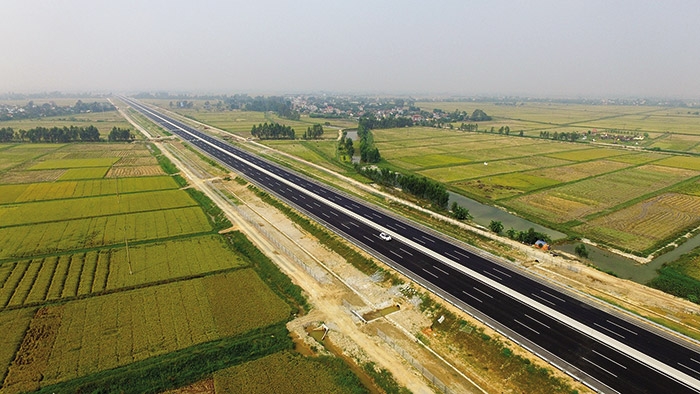Backers seek PPP project assurance
 |
| The Law on PPP Investment will aim to support interested foreign parties, Photo: Duc Thanh |
Leaders of South Korea’s Lotte Group last week worked with the Ministry of Transport (MoT). This meeting followed some recent consecutive ones between both sides. Lotte has been involved in several transportation infrastructure projects in Vietnam, and is now interested in engaging in the North-South expressway project under public-private partnership (PPP) format.
Also last week, MoT Minister of Transport Nguyen Van The met with leaders of 20 cities and provinces, urging them take bold actions in ensuring the implementation schedule of the 11 sections of the project as everything is now ready. The minister informed that the bid for the project is due to be held in January 2019 to find consultants, and then an international bidding process will be open to select contractors for eight PPP sub-projects the following month.
“All 11 sub-projects have their investment plans approved, including three to be developed from state funding, namely Cao Bo-Tay Son, Cam Loc-La Son, and My Thuan 2 bridge. Eight others will be built under the PPP format. The National Assembly has also approved to use VND14.5 trillion ($630.4 million) for site clearance for the whole 654 kilometre project,” he said.
As planned, site clearance will be carried out soon and cleared land will be handed over to localities by the end of 2019’s first quarter. The country will have contractors for PPP sub-projects in early 2020.
These are good signals for interested overseas investors, who often raise concerns on the risk-sharing mechanism of site clearances in PPP projects between the government and businesses, reflecting the country’s strong determination to leverage private investment.
Site clearance in Vietnam is often a slow process, thus causing risks for financiers. In this project, the government will take responsibility for the work and partly fund a part in each of eight PPP sub-projects, while potential investors will do the rest. Furthermore, the country has approved the use of VND27.5 trillion ($1.19 billion) as state capital contribution in PPP investments, thus making it more bankable for PPP projects.
Foreign investors have recently shown interest in the project, which is estimated to cost over VND118.7 trillion ($5.16 billion). It is considered an economically and politically-important venture, linking big cities, economic hubs, international gateway ports, airports, industrial parks, and coastal economic zones.
South Korea-based Posco E&C, Lotte Group, and other international groups from the EU, Japan, and the US are among the prime names.
“The list of sub-projects is very attractive for foreign investors, in particular European ones. EU investors have a good record of PPP projects in highways and airports, including projects implemented in developing countries looking to improve their transport infrastructure. The airport of Santiago and other projects in South America are good examples,” Antoine Logeay, chairman of the European Chamber of Commerce’s Legal Sector Committee, told VIR.
However, EU investors and others are concerned about the drafting of new regulations for PPP projects, particularly the Law on PPP Investment, although the country issued Decree No.63/2018/ND-CP in early May with some never-before-seen changes to support PPP investors.
“Engineering and construction companies need the support of banks and other financial backers. This support is conditional upon a clear and efficient legal framework for PPP in Vietnam,” said Logeay.
The concerns of EU businesses are also similar to other international developers in PPP transport infrastructure projects. The situation of Trung Luong-My Thuan expressway, which is being developed under the PPP format, shows how complex it can be for Vietnam to attract overseas investors in PPP transport undertakings.
The VND10 trillion ($434.8 million) project, in which loans make up 85 per cent of the total capital, has hit a stumbling block as the fixed lending rate cap of 7.82 per cent annually, regulated in Decision No.1700/QD-BGTVT dated June 2017, is now 1.5-3 per cent lower than that announced by commercial banks, thus making the 7.82 per cent rate out-of-date.
The result is blamed on a lack of government guarantee for investment risks in lending interest rate, revenue, and exchange rate risks. These poor results have led to Vietnam failing to successfully develop any PPP transport projects with involvement of overseas funders.
Deputy Minister of Transport Nguyen Nhat told VIR, “The eastern spur of the North-South expressway project will be built with a plan to mobilise over VND63 trillion ($2.7 billion) worth of private investment, of which VND13 trillion ($565 million) will be from investors and VND50 trillion ($2.17 billion) from bank loans, aimed at targeting domestic investors.” Now the MoT and private investors are hoping that the long-awaited PPP law, which can deal with the thorniest issues, will be approved at the National Assembly’s upcoming session, in good time to help push PPP sub-projects into a bankable position.
What the stars mean:
★ Poor ★ ★ Promising ★★★ Good ★★★★ Very good ★★★★★ Exceptional
Related Contents
Latest News
More News
- Hermes joins Long Thanh cargo terminal development (February 04, 2026 | 15:59)
- SCG enhances production and distribution in Vietnam (February 04, 2026 | 08:00)
- UNIVACCO strengthens Asia expansion with Vietnam facility (February 03, 2026 | 08:00)
- Cai Mep Ha Port project wins approval with $1.95bn investment (February 02, 2026 | 16:17)
- Repositioning Vietnam in Asia’s manufacturing race (February 02, 2026 | 16:00)
- Manufacturing growth remains solid in early 2026 (February 02, 2026 | 15:28)
- Navigating venture capital trends across the continent (February 02, 2026 | 14:00)
- Motivations to achieve high growth (February 02, 2026 | 11:00)
- Capacity and regulations among British areas of expertise in IFCs (February 02, 2026 | 09:09)
- Transition underway in German investment across Vietnam (February 02, 2026 | 08:00)

 Tag:
Tag:




















 Mobile Version
Mobile Version